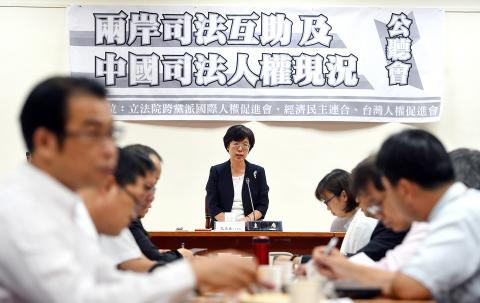The detention of Hong Kong activist Joshua Wong (黃之鋒) in Thailand raised concerns that Taiwanese who travel abroad could face deportation to China for advocating independence, civil campaigners said yesterday at a Legislative Yuan hearing.
“Even though [Wong] was deported back to Hong Kong, we are concerned that the day will come when activists will be sent to China, particularly a Taiwanese could be deported to China from a foreign nation on the basis of violating China’s ‘Anti-Secession’ Law,” said Democratic Progressive Party (DPP) Legislator Yu Mei-nu (尤美女), who chaired the hearing sponsored by the Legislative Yuan’s Parliamentary Cross-Party Group on International Human Rights, Taiwan Association for Human Rights and the Economic Democracy Union.
The jurisdiction of Chinese courts over Taiwanese has been a contentious issue following Kenya’s extradition of Taiwanese implicated in telecommunications fraud to China earlier this year. In a separate fraud case in Malaysia, Taiwanese authorities fought to secure several suspects’ extradition to Taiwan, only to see them released on arrival for lack of evidence.

Photo: Liao Chen-huei, Taipei Times
“To a certain degree, China has forced Taiwan’s legal system into making seemingly unjust decisions by not giving us sufficient evidence or only letting us extradite minor suspects, while they take the main ones. This creates the impression that Taiwan’s legal system is powerless to tackle this type of crime,” Taiwan Association for Human Rights executive committee member Lee Chia-wen (李佳玟) said, adding that addressing extradition issues has become more difficult since President Tsai Ing-wen (蔡英文) took office, which preceded a cooling of cross-strait ties.
Lee said that claims of jurisdiction over fraud cases should be based on the destination of money transfers rather than the suspects’ nationalities in a bid to establish a clear legal claim to jurisdiction.
“Besides protesting against the extraditions, the Executive Yuan and Legislative Yuan should consider including human rights considerations in deciding whether to execute the Cross-Strait Joint Crime-Fighting and Judicial Mutual Assistance Agreement (海峽兩岸共同打擊犯罪及司法互助協議),” Economic Democracy Union convener Lai Chung-chiang (賴中強) said, adding that Ministry of Justice guidelines do not mention human rights.
He cited a lack of judicial independence, forced confessions, admission of illegally acquired evidence and other concerns as reasons to reject Chinese extradition requests on human rights grounds.
According to Ministry of Justice statistics, Taiwan has extradited 12 people to China since the agreement was signed in 2009, while China has extradited 462 people to Taiwan.
Bruce Chung (鍾鼎邦), a Falun Gong practitioner, said that he was allowed to contact his relatives after being detained during a 2012 trip to China only after beginning a hunger strike.
“No one knew that I had been detained. I was kidnapped and ‘evaporated,’” he said. “When I demanded to be allowed to notify my family and to be accompanied by a lawyer, they denied my requests on the basis of ‘national security.’”
Following an international outcry, Chung was released after 54 days in detention, but had to sign a “repentance statement” for allegedly helping Falun Gong activists hijack the signal of a Chinese television station in 2003.

‘DENIAL DEFENSE’: The US would increase its military presence with uncrewed ships, and submarines, while boosting defense in the Indo-Pacific, a Pete Hegseth memo said The US is reorienting its military strategy to focus primarily on deterring a potential Chinese invasion of Taiwan, a memo signed by US Secretary of Defense Pete Hegseth showed. The memo also called on Taiwan to increase its defense spending. The document, known as the “Interim National Defense Strategic Guidance,” was distributed this month and detailed the national defense plans of US President Donald Trump’s administration, an article in the Washington Post said on Saturday. It outlines how the US can prepare for a potential war with China and defend itself from threats in the “near abroad,” including Greenland and the Panama

A wild live dugong was found in Taiwan for the first time in 88 years, after it was accidentally caught by a fisher’s net on Tuesday in Yilan County’s Fenniaolin (粉鳥林). This is the first sighting of the species in Taiwan since 1937, having already been considered “extinct” in the country and considered as “vulnerable” by the International Union for Conservation of Nature. A fisher surnamed Chen (陳) went to Fenniaolin to collect the fish in his netting, but instead caught a 3m long, 500kg dugong. The fisher released the animal back into the wild, not realizing it was an endangered species at

The Chinese Nationalist Party (KMT) is maintaining close ties with Beijing, the Democratic Progressive Party (DPP) said yesterday, hours after a new round of Chinese military drills in the Taiwan Strait began. Political parties in a democracy have a responsibility to be loyal to the nation and defend its sovereignty, DPP spokesman Justin Wu (吳崢) told a news conference in Taipei. His comments came hours after Beijing announced via Chinese state media that the Chinese People’s Liberation Army’s Eastern Theater Command was holding large-scale drills simulating a multi-pronged attack on Taiwan. Contrary to the KMT’s claims that it is staunchly anti-communist, KMT Deputy

The High Prosecutors’ Office yesterday withdrew an appeal against the acquittal of a former bank manager 22 years after his death, marking Taiwan’s first instance of prosecutors rendering posthumous justice to a wrongfully convicted defendant. Chu Ching-en (諸慶恩) — formerly a manager at the Taipei branch of BNP Paribas — was in 1999 accused by Weng Mao-chung (翁茂鍾), then-president of Chia Her Industrial Co, of forging a request for a fixed deposit of US$10 million by I-Hwa Industrial Co, a subsidiary of Chia Her, which was used as collateral. Chu was ruled not guilty in the first trial, but was found guilty